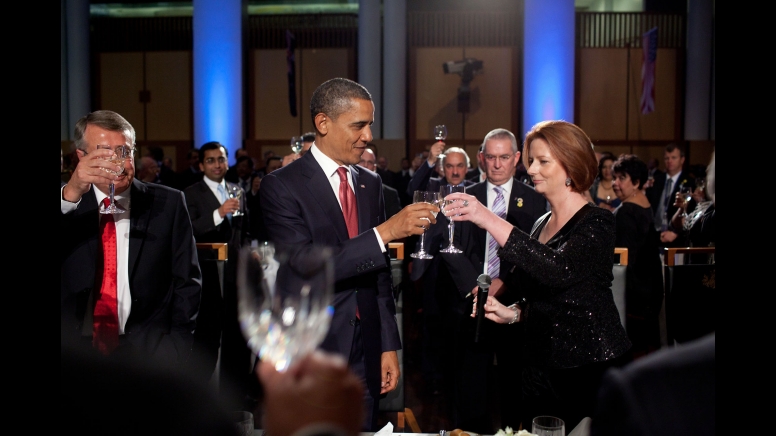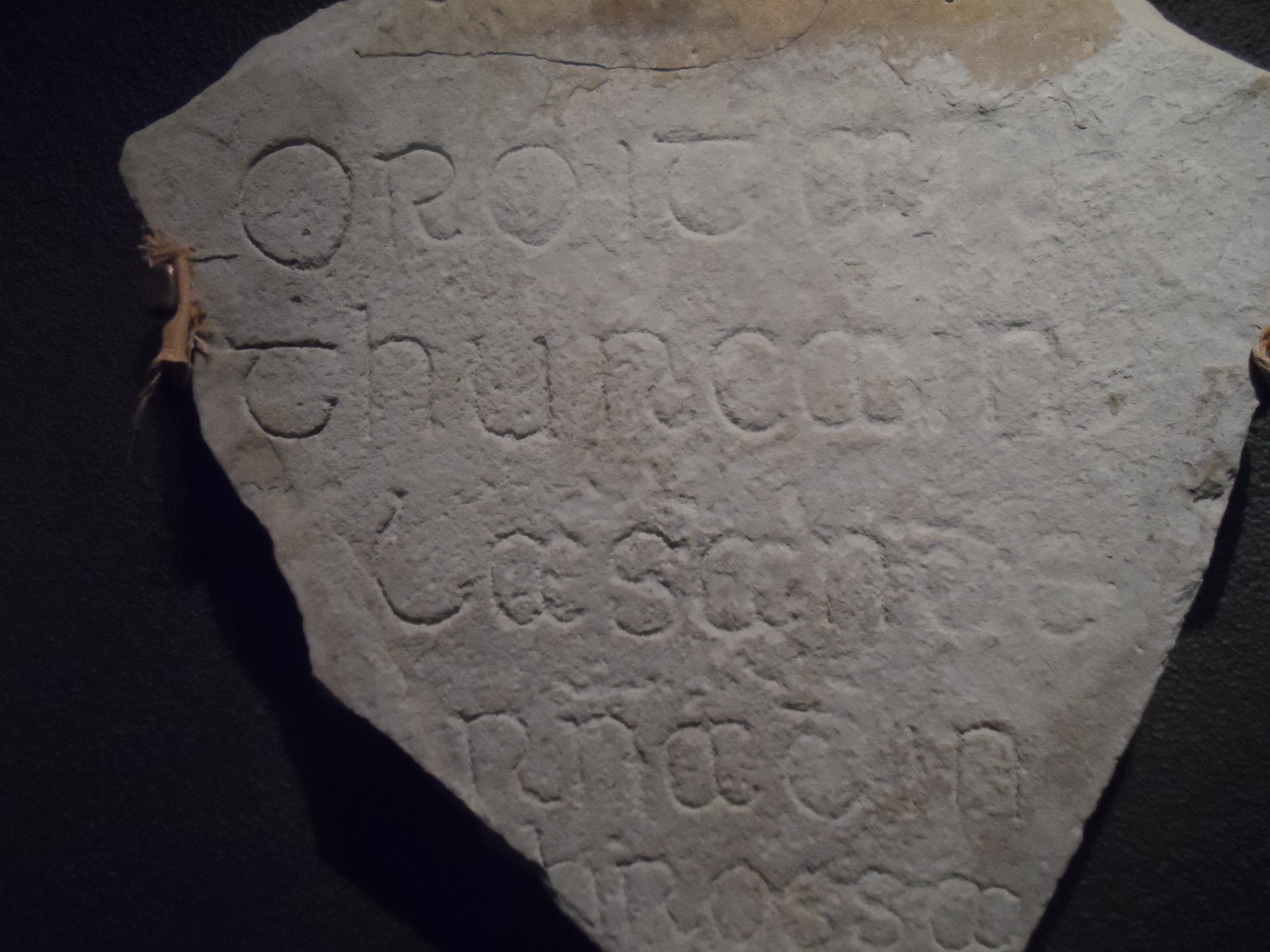|
Sláinte
means "health" in both Irish and Scottish Gaelic. It is commonly used as a drinking toast in Ireland, Scotland and the Isle of Man. However, the toast is also increasingly being used in other countries within the whisky community. Variations is the basic form in Irish. Variations of this toast include "good health" in Irish ( being the lenited form of "good"). In Irish, the response to is , which translates "to your health as well". The basic Scottish Gaelic equivalent is , with the same meaning, to which the normal response is "your good health". There are other variations such as: * "on your health!" with the response "health at yourself!" * "great health" which is also used as a Jacobite toast with the alternative meaning of "health to Marion", Marion () being a Jacobite code name for Prince Charles Edward Stuart. The Manx Gaelic form is or . Alternatively, "healthy body" is also used in Manx. Etymology The word is an abstract noun derived from the Old Iris ... [...More Info...] [...Related Items...] OR: [Wikipedia] [Google] [Baidu] |
Toast (honor)
A toast is a ritual during which a drink is taken as an expression of honor or goodwill. The term may be applied to the person or thing so honored, the drink taken, or the verbal expression accompanying the drink. Thus, a person could be "the toast of the evening", for whom someone "proposes a toast" to congratulate and for whom a third person "toasts" in agreement. The ritual forms the basis of the literary and performance genre, of which Mark Twain's "To the Babies" is a well-known example. The toast as described in this article is rooted in Western culture, but certain cultures outside that sphere have their own traditions in which consuming a drink is connected with ideas of celebration and honor. While the physical and verbal ritual of the toast may be elaborate and formal, merely raising one's glass towards someone or something and then drinking is essentially a toast as well, the message being one of goodwill towards the person or thing indicated. History According to var ... [...More Info...] [...Related Items...] OR: [Wikipedia] [Google] [Baidu] |
Middle Irish
Middle Irish, sometimes called Middle Gaelic ( ga, An Mheán-Ghaeilge, gd, Meadhan-Ghàidhlig), is the Goidelic language which was spoken in Ireland, most of Scotland and the Isle of Man from AD; it is therefore a contemporary of late Old English and early Middle English. The modern Goidelic languages— Irish, Scottish Gaelic and Manx—are all descendants of Middle Irish. Grammar Middle Irish is a fusional, VSO, nominative-accusative language. Nouns decline for two genders: masculine, feminine, though traces of neuter declension persist; three numbers: singular, dual, plural; and five cases: nominative, accusative, genitive, prepositional, vocative. Adjectives agree with nouns in gender, number, and case. Verbs conjugate for three tenses: past, present, future; four moods: indicative, subjunctive, conditional, imperative; independent and dependent forms. Verbs conjugate for three persons and an impersonal, agentless form (agent). There are a number of preverbal ... [...More Info...] [...Related Items...] OR: [Wikipedia] [Google] [Baidu] |
French Language
French ( or ) is a Romance language of the Indo-European family. It descended from the Vulgar Latin of the Roman Empire, as did all Romance languages. French evolved from Gallo-Romance, the Latin spoken in Gaul, and more specifically in Northern Gaul. Its closest relatives are the other langues d'oïl—languages historically spoken in northern France and in southern Belgium, which French (Francien) largely supplanted. French was also influenced by native Celtic languages of Northern Roman Gaul like Gallia Belgica and by the ( Germanic) Frankish language of the post-Roman Frankish invaders. Today, owing to France's past overseas expansion, there are numerous French-based creole languages, most notably Haitian Creole. A French-speaking person or nation may be referred to as Francophone in both English and French. French is an official language in 29 countries across multiple continents, most of which are members of the '' Organisation internationale de la Francopho ... [...More Info...] [...Related Items...] OR: [Wikipedia] [Google] [Baidu] |
Occitan Language
Occitan (; oc, occitan, link=no ), also known as ''lenga d'òc'' (; french: langue d'oc) by its native speakers, and sometimes also referred to as ''Provençal'', is a Romance language spoken in Southern France, Monaco, Italy's Occitan Valleys, as well as Spain's Val d'Aran; collectively, these regions are sometimes referred to as Occitània. It is also spoken in Calabria ( Southern Italy) in a linguistic enclave of Cosenza area (mostly Guardia Piemontese). Some include Catalan in Occitan, as the distance between this language and some Occitan dialects (such as the Gascon language) is similar to the distance between different Occitan dialects. Catalan was considered a dialect of Occitan until the end of the 19th century and still today remains its closest relative. Occitan is an official language of Catalonia, where a subdialect of Gascon known as Aranese is spoken in the Val d'Aran. Since September 2010, the Parliament of Catalonia has considered Aranese Occitan to be ... [...More Info...] [...Related Items...] OR: [Wikipedia] [Google] [Baidu] |
Spanish Language
Spanish ( or , Castilian) is a Romance languages, Romance language of the Indo-European language family that evolved from colloquial Latin spoken on the Iberian peninsula. Today, it is a world language, global language with more than 500 million native speakers, mainly in the Americas and Spain. Spanish is the official language of List of countries where Spanish is an official language, 20 countries. It is the world's list of languages by number of native speakers, second-most spoken native language after Mandarin Chinese; the world's list of languages by total number of speakers, fourth-most spoken language overall after English language, English, Mandarin Chinese, and Hindustani language, Hindustani (Hindi-Urdu); and the world's most widely spoken Romance languages, Romance language. The largest population of native speakers is in Mexico. Spanish is part of the Iberian Romance languages, Ibero-Romance group of languages, which evolved from several dialects of Vulgar Latin in I ... [...More Info...] [...Related Items...] OR: [Wikipedia] [Google] [Baidu] |
Romanian Language
Romanian (obsolete spellings: Rumanian or Roumanian; autonym: ''limba română'' , or ''românește'', ) is the official and main language of Romania and the Republic of Moldova. As a minority language it is spoken by stable communities in the countries surrounding Romania (Bulgaria, Hungary, Serbia, and Ukraine), and by the large Romanian diaspora. In total, it is spoken by 28–29 million people as an L1+ L2, of whom 23–24 millions are native speakers. In Europe, Romanian is rated as a medium level language, occupying the tenth position among thirty-seven official languages. Romanian is part of the Eastern Romance sub-branch of Romance languages, a linguistic group that evolved from several dialects of Vulgar Latin which separated from the Western Romance languages in the course of the period from the 5th to the 8th centuries. To distinguish it within the Eastern Romance languages, in comparative linguistics it is called ''Daco-Romanian'' as opposed to its closest r ... [...More Info...] [...Related Items...] OR: [Wikipedia] [Google] [Baidu] |
Catalan Language
Catalan (; autonym: , ), known in the Valencian Community and Carche as '' Valencian'' ( autonym: ), is a Western Romance language. It is the official language of Andorra, and an official language of three autonomous communities in eastern Spain: Catalonia, the Valencian Community, and the Balearic Islands. It also has semi-official status in the Italian comune of Alghero. It is also spoken in the Pyrénées-Orientales department of France and in two further areas in eastern Spain: the eastern strip of Aragon and the Carche area in the Region of Murcia. The Catalan-speaking territories are often called the or "Catalan Countries". The language evolved from Vulgar Latin in the Middle Ages around the eastern Pyrenees. Nineteenth-century Spain saw a Catalan literary revival, culminating in the early 1900s. Etymology and pronunciation The word ''Catalan'' is derived from the territorial name of Catalonia, itself of disputed etymology. The main theory suggests ... [...More Info...] [...Related Items...] OR: [Wikipedia] [Google] [Baidu] |
Italian Language
Italian (''italiano'' or ) is a Romance language of the Indo-European language family that evolved from the Vulgar Latin of the Roman Empire. Together with Sardinian, Italian is the least divergent language from Latin. Spoken by about 85 million people (2022), Italian is an official language in Italy, Switzerland ( Ticino and the Grisons), San Marino, and Vatican City. It has an official minority status in western Istria (Croatia and Slovenia). Italian is also spoken by large immigrant and expatriate communities in the Americas and Australia.Ethnologue report for language code:ita (Italy) – Gordon, Raymond G., Jr. (ed.), 2005. Ethnologue: Languages of the World, Fifteenth edition. Dallas, Tex.: SIL International. Online version ... [...More Info...] [...Related Items...] OR: [Wikipedia] [Google] [Baidu] |
Romance Language
The Romance languages, sometimes referred to as Latin languages or Neo-Latin languages, are the various modern languages that evolved from Vulgar Latin. They are the only extant subgroup of the Italic languages in the Indo-European language family. The five most widely spoken Romance languages by number of native speakers are Spanish (489 million), Portuguese (283 million), French (77 million), Italian (67 million) and Romanian (24 million), which are all national languages of their respective countries of origin. By most measures, Sardinian and Italian are the least divergent from Latin, while French has changed the most. However, all Romance languages are closer to each other than to classical Latin. There are more than 900 million native speakers of Romance languages found worldwide, mainly in the Americas, Europe, and parts of Africa. The major Romance languages also have many non-native speakers and are in widespread use as linguae francae.M. Paul Lewis,Summary ... [...More Info...] [...Related Items...] OR: [Wikipedia] [Google] [Baidu] |
Julius Pokorny
Julius Pokorny (12 June 1887 – 8 April 1970) was an Austrian-Czech linguist and scholar of the Celtic languages, particularly Irish, and a supporter of Irish nationalism. He held academic posts in Austrian and German universities. Early life and education He was born in Prague, Bohemia, under the Austro-Hungarian Empire, and he was educated at the Piarist School in Prague and the Benedictine Abbey school in Kremsmünster, Austria. From 1905 until 1911, he studied at the University of Vienna, graduating in law and philology, and he taught there from 1913 to 1920. Career During World War I, Pokorny was involved in pro-German propagandist activities, inciting the Irish against England. He is known to have met and corresponded with Roger Casement, an activist for Irish independence who was executed in 1916. Pokorny also served in the war as a reservist in the Austrian (Cisleithanian) Army starting in 1916. In 1920, he succeeded Kuno Meyer as Chair of Celtic Philology a ... [...More Info...] [...Related Items...] OR: [Wikipedia] [Google] [Baidu] |







